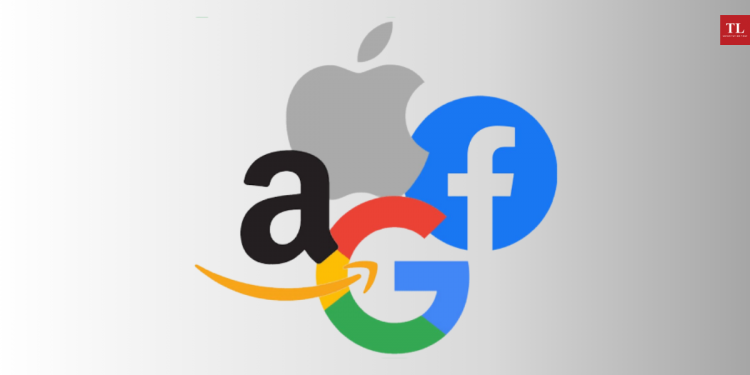Need to Rein in Big Tech Before it Gallops Beyond Control

In light of the recent Karnataka High Court order rejecting the demand by tech companies Amazon and Flipkart to stay a Competition Commission of India-directed investigation into the two companies, VASANTH ADITHYA. J explains the excessive influence that Big Tech companies have come to enjoy in global affairs, and why the world has started to push back against their monopoly power.
—-
The hurtling pace at which ‘Big Tech’ is enormously affecting the world, in general, and our personal lives, in particular, should be immediately checked. From crippling business rivals with their anti-competitive practices to shaping dangerous political discourse—as evidenced in the 2016 US presidential race—during elections, the tech giants wield unbelievable powers.
Despite facing increasing heat from competition regulators across the globe for anti-competitive practices, the ‘Big Five’—Google, Apple, Facebook, Amazon and Microsoft—have firmly entrenched themselves in the digital market, which calls for stricter executive action and judicial intervention.
Indian small and medium businesses have long accused e-commerce titans like Amazon India and Walmart-owned Flipkart of anti-competitive practices, preferential treatment of sellers and predatory pricing.
In 2019, the Delhi Vyapar Mahasangh, a registered society of several Micro, Small and Medium Enterprise (MSME) traders, pleaded with the Competition Commission of India (CCI) alleging that Amazon India and Flipkart were abusing their monopolistic positions and giving preferential listing and deep discounting on products, like smartphones, sold by select vendors.
Subsequently, the CCI ordered an anti-competitive investigation into the two e-commerce giants in 2020 that was stayed by the Karnataka High Court (HC). However, earlier this month, the High Court rejected the writ petitions of Amazon and Flipkart requesting quashing of the probe and an extension of the stay.
The 51-page order, by Justice P.S. Dinesh Kumar, is exemplary as it not only protects the interests of small retailers in a massive burgeoning consumer market like India but also shows how appropriate judicial and regulatory intervention can curb the monopoly of corporate giants in the digital market space.
Also read: Surveillance, Data Imperialism and Transition to a Post Human World
All-pervasive influence of social media
The most-valued companies till 2010, in the oil and energy sectors, have now been unseated by the ‘Frightful Five’—a term coined by New York Times tech columnist Farhad Manjoo, who warned in 2017 that that “they are collectively more powerful than many governments”.
Having amassed more power and wealth than any other industry, social media giants like Facebook and Twitter are extensively used for political propaganda to spread disinformation and fake news, polarise people racially and communally, and even incite violence and organise anti-government protests.
These platforms don’t just monetise and control human behaviour on simple choices an individual makes using real-time analytics, but could also decide a country’s fate.
The use of social media—Facebook, Twitter and others—in the Arab Spring, organising mass protests in Hong Kong, Russia and Belarus, disseminating disinformation by autocrats like Russian President Vladimir Putin and former US President Donald Trump and whipping up hatred against the Rohingyas in Myanmar show the all-pervasive influence of tech titans.
Also read: Digital Divide: Is Big Brother Trying to Control the Booming Internet Space?
Pandemic widened economic inequality
COVID-19 was a catalyst to e-commerce sales globally as people preferred ordering even items of daily consumption online. The massive accumulation of wealth by Big Tech as COVID-19 ravaged the world, killed almost four million and turned millions jobless shows how it has become a juggernaut unstoppable even in the face of the pandemic, which—as per a World Bank warning last October—could push 150 million into poverty by this year.
According to company filings, the net income of Apple in the first quarter of 2021 as against 2020 soared by 110% to $23.6 billion, Google’s parent company Alphabet 162% to $17.9 billion, Microsoft 44% to $15.5 billion, Facebook 94% to $9.5 billion and Amazon 220% to $8.1 billion.
Between March 18, 2020, and April 12, 2021, the collective wealth of American billionaires jumped by $1.62 trillion, or 55%, from $2.95 trillion to $4.56 trillion. Amazon’s Jeff Bezos, with a net worth of nearly $197 billion, was up 74%. Tesla and Space X founder Elon Musk, with $172 billion, was up an astounding 599% during the pandemic. Microsoft co-founder Bill Gates, worth $130 billion, was up 33% since March 2020 and Facebook CEO Mark Zuckerberg has $113.5 billion, a fortune that more than doubled (up 108%).
Also read: Has Google’s monopolist tendencies hurt users’ interest?
Global action not effective against Big Tech
Efforts by lawmakers and regulators across the globe to curb anti-competitive behaviour have been sluggish. Though US tech companies have faced increasing scrutiny over their power and ant-market practices, political divisions often hinder further action. For example, the US House Judiciary Committee’s Antitrust Subcommittee, in an investigation into the state of competition in the digital economy last October, found that Apple, Amazon, Google, and Facebook have “expanded and exploited their power of the marketplace in anti-competitive ways”.
When Democrats demanded changes following the release of the findings to break the monopoly of these companies, they faced Republican opposition.
The Big Tech have faced legal backlash in Canada, the UK, Germany, France, Italy, Ireland, Spain, Australia and Japan besides India. But their monopoly and power is unabated.
European Union fines announced on the tech giants have either not been imposed due to settlements arrived between the parties or they are too meagre to affect their revenues.
Also read: Should Twitter Have the Power to Lock an Account?
Need for encompassing e-commerce laws
Regulators should not only identify and curb big tech’s anti-competitive actions more stringently but also block the spread of fake news and disinformation of social media platforms.
India has proposed amendments to the Consumer Protection (E-Commerce) Rules, 2020, and sought public comments on banning “mis-selling’ and fraudulent “flash sale” of goods and services on e-commerce platforms. The Centre intends to regulate unfair trade practices and hold the e-tailers partly responsible, in case, of a defective product or deficiency in services.
We need laws and regulations that end the monopoly of such tech companies, protect the consumer from predatory practices and promote free and fair trade competition.
Preventing social media platforms like Facebook, Instagram, WhatsApp and Twitter from aiding the spread of disinformation, misinformation and fake news should be a global effort—but it should be unbiased. For example, targeting Twitter for flagging misleading posts of people in power but turning a blind eye to hate speech by government supporters is sheer hypocrisy.
(Vasanth Adithya. J is a practising advocate at the High Court of Karnataka and the author of ‘Conceptual Foundations of Competition Law in India’. The views expressed are personal.)
Get the latest reports & analysis with people's perspective on Protests, movements & deep analytical videos, discussions of the current affairs in your Telegram app. Subscribe to NewsClick's Telegram channel & get Real-Time updates on stories, as they get published on our website.
























